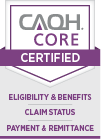Section 1104 of the Patient Protection and Affordable Care Act (ACA) (H.R.3590) establishes new requirements for administrative transactions to improve the utility of the existing Health Insurance Portability and Accountability Act (HIPAA) transactions and reduce administrative costs. These operating rules address gaps in standards, help refine the infrastructure that supports electronic data exchange, and recognize interdependencies among transactions.
Alabama Medicaid is CAQH CORE Certified
 Alabama Medicaid Agency received CAQH (Council for Affordable Quality Healthcare) Committee on Operating Rules for Information Exchange (CORE®) certification for Affordable Care Act (ACA) Operating Rules Phases I, II and III. The Agency committed to become CORE-certified. Valued trading partners,are encouraged to complete CORE-certification to improve access to eligibility, benefits, and claims data.
Alabama Medicaid Agency received CAQH (Council for Affordable Quality Healthcare) Committee on Operating Rules for Information Exchange (CORE®) certification for Affordable Care Act (ACA) Operating Rules Phases I, II and III. The Agency committed to become CORE-certified. Valued trading partners,are encouraged to complete CORE-certification to improve access to eligibility, benefits, and claims data.
Click here to access additional information on how to become CORE-certified and the benefits to vendors, clearinghouses and providers.
ACA Section 1104 applies to HIPAA covered entities and business associates engaging in HIPAA standard transactions on behalf of covered entities.
• CAQH - Committee for Affordable Quality Healthcare is a nonprofit alliance of health plans and trade associations which provides a catalyst for industry collaboration on initiatives that simplify healthcare administration
• CORE - Committee on Operating Rules for Information Exchange is a multi-stakeholder
collaboration developing industry-wide operating rules, built on existing standards, to streamline administrative transactions and reduce administrative burdens. CORE focuses on a subset of the areas that the larger CAQH organization engages in.
Phase I/II - Eligibility and Claim Status Operating Rules
Per the CAQH website, "CORE operating rules streamline eligibility, benefits, and claims data by allowing providers to submit a request, using the electronic system of their choice, to obtain a variety of coverage information for any patient and from any participating health plan."
Phase I Overview
Phase I Operating Rules apply to eligibility (270/271) transactions only. Most changes associated with this phase were implemented October 26, 2013.
Phase II Overview
Phase II Operating Rules apply to (270/271) and claim status (276/277) transactions only. Most changes associated with this phase were implemented October 26, 2013.
For more information on HIPAA-mandated Healthcare Operating Rules select the Operating Rules Mandate tab on the following link: https://www.caqh.org/core/operating-rules
"Safe Harbor" Implementation
Implementation of the final ACA Phase I/II Rule, Rule 270 provides a "safe harbor" where vendors, providers and health plans can be assured their transactions will be supported by any CORE-certified trading partner. For more information on this rule, visit the CAQH CORE website.
Related Links
• The HIPAA Companion Guide for 5010 includes changes related to CORE Phase I & II rules and can be found at this link. Questions may be submitted to InterChange_testing@gainwelltechnologies.com
• Refer to the Provider Alert: Alabama Medicaid Implementation of CORE Rules Phase I & II for more information.
Phase III - EFT & ERA Operating Rules
Phase III Operating Rules support Electronic Funds Transfer (EFT) and Electronic Remiitance Advice (ERA/835) transactions. The Rules encourage entities to use the infrastructure they have for eligibility and claim status and apply it to the health care claim payment/advice. Phase III was Implemented July 14, 2015.
• CAQH CORE 350: Health Care Claim Payment/Advice (835) Infrastructure Rule
• CAQH CORE 360: Uniform Use of CARCs and RARCs (835) Rule
• CAQH CORE 370: EFT & ERA Reassociation (CCD+/835) Rule - **includes early actions for providers
• CAQH CORE 380/382 : EFT/ERA Enrollment Data Rules - **includes early actions for providers
The rules should be reviewed by all providers and their trading partners to determine impacts to their systems. The rules can be accessed on the CAQH website.
Visit the Centers for Medicare & Medicaid Services (CMS) website, where you will find more information in the Regulations and Guidance section, under HIPAA Administrative Simplification.